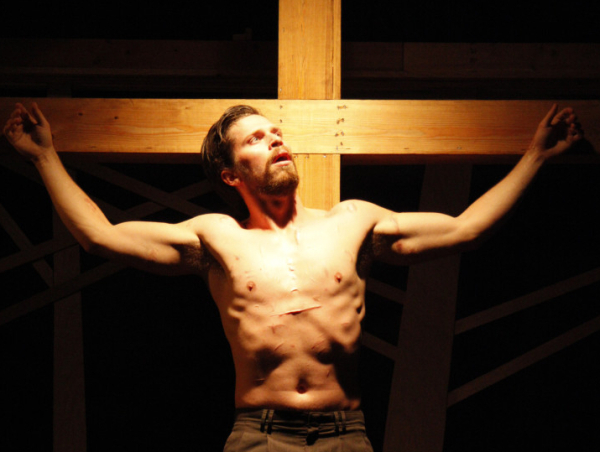
(© Thamer Bajjali)
However you choose to slice it — and with three parts, a theater company has slicing options — Sarah Ruhl’s Passion Play remains two-thirds a challenging evening of drama and one-third political screed. This is one of those rare cases of a mature playwright at the top of her game returning to the work she began developing in college, and cluttering rather than improving it.
In Ruhl’s depiction of actors enacting the life of Christ in three politically charged historical eras, we’re witnessing struggles with faith and religion, certainly, but also with identity and socio-political responsibility. That Queen Elizabeth I, Adolf Hitler, and Ronald Reagan also offer their philosophical guidance stirs an already roiling pot well past the intellectual boiling point. So it goes, as Passion Play hops from Renaissance England, to Fascist Germany to Spearfish, South Dakota 1969-1984. Whatever the circumstance, the onus of playing these roles can wreak serious havoc with a person’s sense of self, particularly in a place like Oberammergau or Spearfish where participation in The Passion is both a civic tradition and a birthright.
Alas, the subtlety of Ruhl’s touch falls away when she moves the action, for part three, to America. It’s here that director Trever Biship’s largely excellent production for Chance Theater goes off the rails despite — and in some cases because of — performer Casey Long’s raging efforts to keep things in focus. Once the play quiets down and Ruhl connects the three parts of her trilogy, the viewer is exhausted and feeling more than a little bit bludgeoned.
"You’ve grown since last year," says a carpenter to John the Fisherman (played by Ben Moroski) as he takes the actor’s measurements as John leans, arms outstretched, against a cross. We’re in Queen Elizabeth I’s England, and friars like the one visiting this Passion (Karen O’Hanlon) have to practice Catholicism in secret. John, a secret and quite devout Catholic, is tapped to play Christ in The Passion year after year while his crippled, stinking brother, who is known as Pontius the Fish Gutter (Long), must forever play Christ’s executioner. Mary the Virgin (Camryn Zelinger) lusts after John who is too chaste and Christ-like to satisfy her. Pilate, on the other hand, has no such qualms. Meanwhile Mary Magdalene (Katelyn Schiller) dreams of kissing women and the Village Idiot (Alex Bueno), a jack in the box-toting simpleton who simply wants a part — any part — in the play. Meanwhile, the sky is turning red, a phenomenon that has everyone justifiably on edge. Something — or someone — is coming.
Ruhl shuffles the deck in all sorts of interesting ways in the ensuing two segments. In 1934 Oberammergau, Moroski’s John becomes a reluctant Christ, taking over the role from his father and secretly in love with a German soldier (Long) while Zelinger’s Mary is a rising actress having her way with a Nazi officer (Jackson Tobiska). The Village Idiot is here too, helping John learn his lines. In the America segment in South Dakota, the relationships and clothing may change, but images, themes, and lines of dialogue echo across the centuries.
Biship’s staging — with all three parts broken up by two intermissions — affords his actors a cornucopia of acting challenges. And, indeed, performances deepen or take on new shadings as the role or the circumstance changes. As Elizabeth, Hitler, and Reagan, Karen Webster takes on three hugely different rulers, one more tyrannical or egotistical than the next. Yet the actor’s work here is never overboard or leaning toward caricature. Zelinger’s trio of Marys is a charismatic study of loneliness, manipulation, and desperation. "I don’t want to lose my part," Mary says, on more than one occasion. It’s a sentiment that could apply to any number of characters wrapped up in The Passion.
Pontius is the part with the greatest potential for gusto. Long, a Chance Theater founding member and the company’s managing director, morphs smoothly between eras (although at times his present-day Pontius sounds a bit like Nicolas Cage). Part three tracks Pontius to Vietnam and back home. Where the actor had plenty of opportunity for histrionics in the first two parts, Long held back. In part three, however, the play gets louder and Long defaults to screaming. That’s not entirely his fault. Part three, written before the 2004 election, is kind of a scream. Between all three political leaders shuttling through (including Queen Elizabeth packing a rifle in Vietnam), the psychologically damaged veteran story, and Ruhl connecting thematic dots across the two previous parts, the Spearfish section of Passion Play bloats the overall experience.
All of the action takes place on a bare, unvarnished wooden set created with great functionality by Fred Kinney. Brandon Baruch’s lighting and Jeff Polunas’s sound design nicely help to fill out the canvas. The playwright’s talent and the abilities of the Chance Theater actors are considerable, but with all of these flavors combined, Passion Play becomes a banquet with one course too many.









